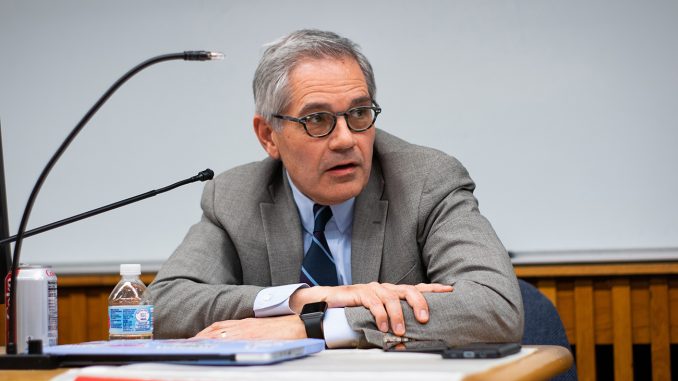
The law treats guilty, rich people better than it treats innocent, poor people, said District Attorney Larry Krasner to students during a visit to Main Campus on Wednesday.
Krasner discussed how the criminal justice system unfairly targets minority communities with about 100 attendees. Two other panelists, Claire Shubik-Richards, executive director of the Philadelphia Prison Society and Tyrone Werts, international think tank coordinator for the Inside-Out Prison Exchange program, joined Krasner to contribute their thoughts about what they said is a flawed system.
“There is absolutely no question that in a larger, urban environment the pattern of policing is one where if you are young and Black you are going to have 50, 75 opportunities to be stopped by police and for them to have contact with you that might end poorly,” Krasner said during the event.
Temple’s chapter of Pi Sigma Alpha, the National Political Science Honor Society, organized Krasner’s visit.
Krasner’s accomplishments in criminal justice reform were the driving motivation for the organization to host him on Wednesday, said Conor Freeley, a senior political science and global studies major and president of the Temple chapter.
“Krasner and his office have changed the attitudes, the way the DA office works,” Freeley said. “Changing the way that the DA’s office approaches crime and criminal justice is the most important thing, long-term.”
Krasner’s office implemented policies in 2018 as part of a larger effort to reduce the city’s jail population, which resulted in a 30 percent drop in inmates within his first year, WHYY reported. The DA’s staff stopped charging for marijuana possession and the city also no longer requires bail money for low-level offenses, which are 61 percent of all cases in Philadelphia’s the criminal justice system, the Inquirer reported.
Krasner’s efforts support his belief that increased incarceration does not reduce future crime, but weakens communal foundations and reinforces class and racial inequalities.
“When you continue to police some neighborhoods and leave others completely alone, the people you police so heavily are going to end up with longer criminal records and that is going to affect their ability to participate in the economy,” Krasner said.
Krasner’s progressive policies have made waves within Philadelphia and beyond — largely in part due to the high number of cases he’s tried, he said.
“There are thousands of prosecutors across the country, but many of them are in very small jurisdictions where frankly, it is not going to make much of a difference,” Krasner said.
“It can have a big impact because in many ways people see the experiment that’s going on in these big cities and they see that it…is effective at keeping crime down and healing society, he added. “Then the smaller jurisdictions are liable to follow because they see it works.”
Camille Desierto, a sophomore criminal justice major, said Krasner related well to college students.
“[Before Krasner’s discussion], I didn’t know about the history and significance of past laws and their impact on sentencing today,” she said.
With laughter and smiles from the audience, Krasner relayed a final piece of advice to students.
“You have to do what is in your heart, what is going to make you whole, and if you do that you’re going to get a hell of a lot done,” he said.


Well written and informative.